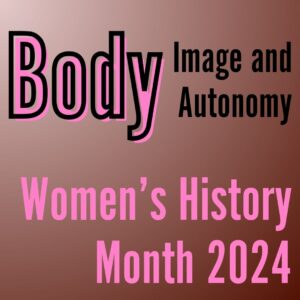
Susanna Howard
Susanna Howard is a Library Assistant in the Adult Services Department at CDPL.
 What should you do with your body? What are you allowed to do with your body? Who gets to decide? These questions are central to women’s struggles throughout history. This Women’s History Month, we are highlighting items in the collection that deal with women’s body image and bodily autonomy, past and present.
What should you do with your body? What are you allowed to do with your body? Who gets to decide? These questions are central to women’s struggles throughout history. This Women’s History Month, we are highlighting items in the collection that deal with women’s body image and bodily autonomy, past and present.
“Stuff Mom Never Told You: the Feminist Past, Present, and Future” by Anney Reese & Samantha McVey (305.420973 Reese) is a new overview of feminism in the late 20th century, including how these issues of controlling and assigning worth to women’s bodies overlap with race, identity, and ability. Get help navigating these difficult topics with the young people in your life with Kimberly Wolf’s “Talk With Her: a Dad’s Essential Guide to Raising Healthy, Confident, and Capable Daughters” (649.133 Wol).
Should women have to change their bodies to be respected? What if they can’t change? “Face: One Square Foot of Skin” by Justine Bateman (646.72 Bat) expounds on the pressure for women to look young and flawless, and the impact on women’s self-esteem when visibly aging is seen as something to be fixed. Evette Dionne discusses her experiences of prejudice in the doctor’s office and on the dating scene as a fat Black woman in “Weightless: Making Space for My Resilient Body and Soul” (305.48 Dio).
There’s a particular shape associated with womanhood, but it doesn’t fit every woman. What does this mean for those left out? Catherine Guthrie recounts her changing relationship with her body following her mastectomy in “Flat: Reclaiming my body from breast cancer” (921 Guthrie, C.). Rhea Ewing’s “Fine: A Comic About Gender” (GN 920 Ewi) continues this thought, collecting a series of interviews in an attempt to understand what exactly makes a person’s body a woman’s.
Where do the rules about women’s bodies come from? Kathleen M. Crowther’s new book, “Policing Pregnant Bodies: From Ancient Greece to Post-Roe America” (344.0419 Crowther), breaks down historical perceptions of pregnancy and their relation to modern politics. “Wayward Lives, Beautiful Experiments: Intimate Histories of Social Upheaval” by Saidiya Hartman (305.48 Har) investigates the unconventional personal lives of young Black women in the early twentieth century as they explored what it meant to be free to choose.
There are a billion different offshoots of this broad topic and a trillion different opinions at play; these are just the highlights. If you don’t see what you’re looking for, you can browse our full collection in person or on our online catalog. Remember, your library card provides more than just print books. You can access ebooks, documentaries, scholarly articles, and more on any subject of your choosing through the Econtent section of our website.
